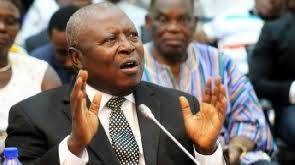Vacant Seats Brouhaha: "You've Usurped Supreme Court's Jurisdiction" – Martin Amidu Tells Speaker
The ongoing debate over the vacant seats in Ghana's Parliament has reached a new crescendo, with former Special Prosecutor Martin Amidu publicly admonishing the Speaker of Parliament. In a recent statement, Amidu accused the Speaker of usurping the jurisdiction of the Supreme Court by declaring certain parliamentary seats vacant without due legal process. His remarks have reignited discussions about the balance of power within Ghana’s political institutions and the implications for governance and democratic representation.
Context of the Controversy
The controversy erupted when the Speaker of Parliament announced that four parliamentary seats were vacant due to the prolonged absence of their respective Members of Parliament (MPs). This decision has sparked significant backlash from various political factions and civil society groups, who argue that the Speaker overstepped his authority. Critics assert that the declaration of vacancy should fall within the judicial purview of the Supreme Court, which has the final say on matters concerning parliamentary representation.
Amidu’s intervention adds weight to this argument, highlighting the potential consequences of bypassing the established legal framework. He contends that the Speaker’s actions could set a dangerous precedent, undermining the rule of law and eroding public trust in Ghana’s democratic institutions.
Amidu’s Legal Arguments
In his critique, Amidu emphasized that the Constitution clearly delineates the powers and responsibilities of the various branches of government. He argued that while the Speaker has a crucial role in maintaining order and decorum within Parliament, the authority to declare seats vacant lies with the judiciary, specifically the Supreme Court. By making such declarations unilaterally, Amidu suggests that the Speaker is encroaching on the judiciary's domain and could be seen as politicizing the issue.
Amidu’s comments resonate with broader concerns regarding the integrity of the political process in Ghana. He urges lawmakers and political leaders to respect the rule of law and adhere to constitutional provisions to ensure accountability and transparency. His assertion serves as a reminder that democracy is built on checks and balances, and no single branch should wield unchecked power.
Implications for Governance and Democracy
The implications of Amidu’s statement extend beyond legal technicalities. The manner in which Parliament addresses the issue of vacant seats has significant consequences for governance and public trust. When elected representatives are absent, it creates a disconnect between them and their constituents, jeopardizing effective governance and accountability. Amidu’s call for adherence to due process emphasizes the need for MPs to fulfill their responsibilities to the electorate.
Moreover, the controversy highlights the importance of clarity and consensus in governance. As political tensions mount, it becomes essential for leaders to engage in constructive dialogue rather than exacerbating divisions. A unified approach to addressing the vacant seats issue would not only restore confidence in parliamentary processes but also reinforce the principle of representative democracy.
Conclusion
Martin Amidu’s admonition to the Speaker of Parliament regarding the declaration of vacant seats underscores critical issues surrounding jurisdiction, accountability, and the rule of law in Ghana. As the nation grapples with the implications of this controversy, it is essential for political leaders to reaffirm their commitment to democratic principles and the Constitution. The way forward must prioritize collaboration, transparency, and respect for established legal frameworks to foster a more accountable and responsive governance system. By addressing these challenges, Ghana can strengthen its democratic institutions and enhance public trust in the political process.


